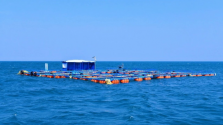where do you get those numbers from?The problem with green hydrogen is low energy efficiency, around 50% efficiency to electrolyze water, around 50% fuel cell efficiency to turn hydrogen into electricity, so overall about 25% energy efficiency.
Battery on the other hand has over 80% overall efficiency.
I have no doubt the future is going to be solar + storage, my bet is on battery. Especially as battery is getting cheaper and cheaper, cycle time keeps improving, now they are at 10k cycles, consider one charging cycle per day that is about 30 years of use. Only thing is to worry about scarcity of materials such as lithium, CATL's sodium battery is one to pay attention to.
the most recent electrolyzer from Mingyang has power usage of 3.8 kwh/NM3
H2 fuel density is 33.6 kwh/KG 1KG = 11.2 NM3, so fuel density is 3.0 kwh/NM3
so we are already at 79% in efficiency with alkaline electrolyzer. SOEC electrolyzer can get close to 100%
As for just use Hydrogen fuel purely for electricity, you can get 60+% efficiency with combine cycle gas turbine that does is able to handle both NG and H2. If you get one more optimized for H2, I wouldn't be surprised if you can get to 70% efficiency
In fact, the theoretical max I think is close to 75 to 80%.
battery storage is cheaper, but how are you going to transport from 1 region to another? What if you have a lot of excessive electricity that battery packs can't hold? How do you sell excessive energy to other countries that aren't connected to the same power grid as you?

